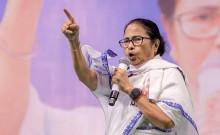Several people assembled outside Downing Street and in cities across the United Kingdom on Saturday, 28 November, to oppose the government's plans to bomb Islamic State (Isis) targets in Syria.
The protest, arranged by an organisation called the "Stop the War Coalition" on a short notice, followed constant calls for military action against the terror group that took responsibility of the 13 November attack on Paris, which killed 130 people.
Nearly 4,000 people participated in the protest outside the Downing Street, though "Stop the War" said prior to the event that about 8,000 people were expected to arrive. Smaller protests also took place in towns like Norwich, Coventry, Bristol, Milton Keynes, Swansea and Manchester.
"We've got thousands of people here and we've blocked Whitehall, and there are dozens of demonstrations going on around the country. I'm very pleased," said Lindsey German, who organised the Downing Street protest for "Stop the War," adding that the event was a "good start."
"We need to unite with Muslims in our community and not foster division," says Daisy, 22 at #DontBombSyria protest pic.twitter.com/IWTJFmAosQ
— Joel Gunter (@joelmgunter) November 28, 2015
Homemade banners and placards at the @STWuk #DontBombSyria protest pic.twitter.com/BICand0NFz — Joel Gunter (@joelmgunter) November 28, 2015
Many celebrities like musician Brian Eno, actor Mark Rylance and Shadow International Development Minister Diane Abbot also took part and spoke at the protest, reported the Guardian.
While speaking at the event, Eno said: "I'm tired with being associated with terrorism. I'm tired of my tax money going towards violent solutions to problems of injustice."
Parliament will be voting on the issue next week after UK Prime Minister David Cameron urged MPs to support military action.
The issue has created a rift within the ranks of the Labour party, with leader Jeremy Corbyn publicly at odds with Hillary Benn, shadow foreign secretary.
"Stop the War" has urged its members to urge MPs to vote against the strikes, and on Friday, 27 November, it said 28,000 people had used the Internet to send letters to their local MP, The Guardian reported.

















